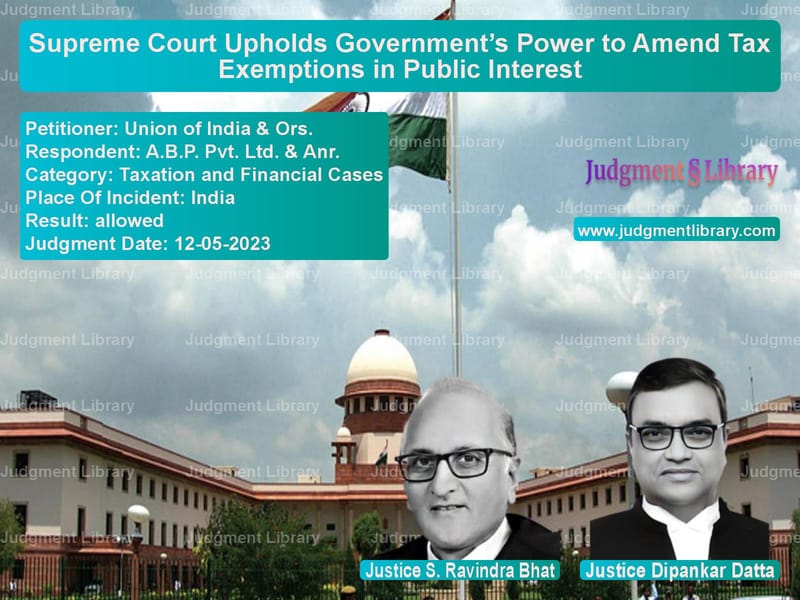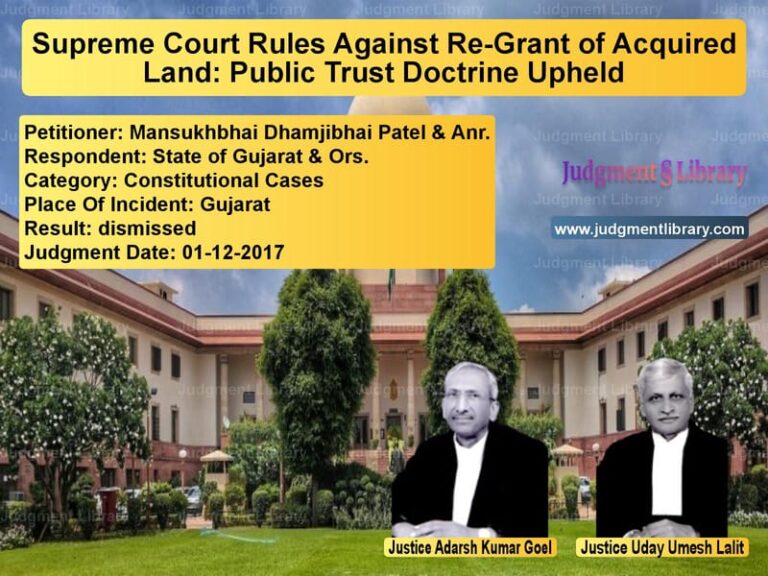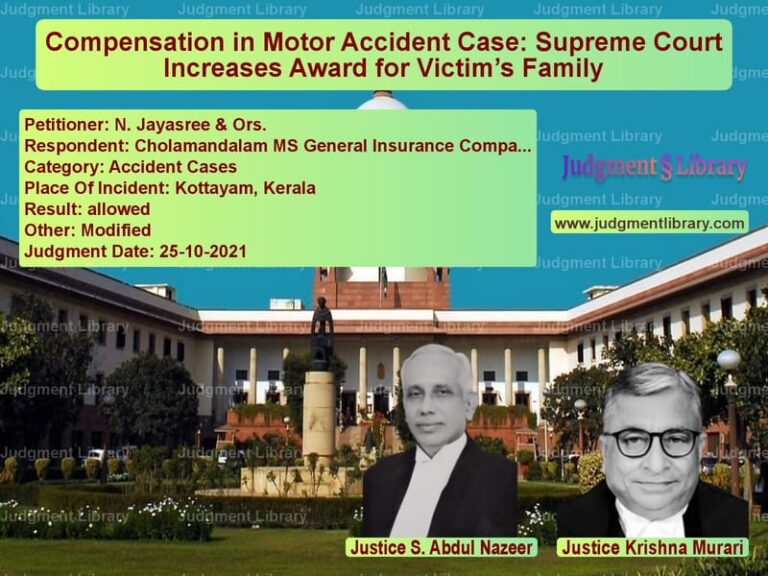Supreme Court Upholds Government’s Power to Amend Tax Exemptions in Public Interest
The case of Union of India & Ors. vs. A.B.P. Pvt. Ltd. & Anr. addresses a crucial legal question regarding the power of the government to amend or withdraw tax exemptions under Section 25(1) of the Customs Act, 1962. The Supreme Court overturned the Calcutta High Court’s ruling and upheld the Union Government’s decision to amend a customs notification that had earlier granted a concessional rate of duty on high-speed printing machines.
Background of the Case
The dispute arose when A.B.P. Pvt. Ltd. (hereinafter “the assessee”) imported a high-speed cold-set web offset rotary printing machine in October 2003. At that time, the government had issued Notification No. 86 of 2003 on May 28, 2003, which provided for a concessional customs duty rate of 5% on the import of these machines.
Relying on this notification, the assessee issued an irrevocable letter of credit for the purchase of the printing machine. However, before the goods arrived in India, the government amended the exemption notification on November 11, 2003 (Notification No. 164 of 2003). The amendment restricted the concessional rate to only those printing machines that were double-width and four-plate wide, effectively excluding the assessee’s single-width two-plate machine from the exemption.
When the assessee filed a Bill of Entry on February 9, 2004, seeking the 5% concessional duty, the customs authorities denied the exemption, instead demanding a duty of 39.2%. The assessee filed a writ petition in the Calcutta High Court, challenging the amended notification as ultra vires of Section 25(1) of the Customs Act, 1962.
High Court’s Ruling
The Calcutta High Court ruled in favor of the assessee, holding that:
- The amendment lacked a reasonable classification because both the previously exempted and newly exempted machines had the same printing speed.
- The government’s justification that it aimed to protect indigenous manufacturers was flawed since there was no evidence that the machines were manufactured in India.
- The amended notification lacked a legitimate public interest basis and was therefore unconstitutional.
The High Court directed the customs authorities to grant the benefit of the earlier concessional duty to the assessee.
Aggrieved by the ruling, the Union of India appealed to the Supreme Court.
Petitioner’s Arguments (Union of India)
The Additional Solicitor General (ASG) representing the government argued:
- The power to issue exemptions under Section 25(1) of the Customs Act includes the power to modify or withdraw them.
- The amendment was made in public interest to encourage technological advancement in the domestic printing industry.
- The government had received representations from domestic manufacturers, arguing that single-width machines should not receive concessions because they could be manufactured in India.
- The decision was based on a sound economic policy and was beyond the scope of judicial review.
- As per Section 21 of the General Clauses Act, 1897, the power to grant an exemption includes the power to amend or rescind it.
Respondent’s Arguments (A.B.P. Pvt. Ltd.)
The assessee, through its counsel, contended:
- The withdrawal of the exemption was arbitrary and lacked a valid rationale.
- The government had no evidence that domestic manufacturers could produce the excluded machines.
- The assessee had already contracted to purchase the machine before the amendment and could not reverse the transaction.
- Under the principle of promissory estoppel, the government could not revoke an exemption that had been relied upon by businesses.
- The High Court correctly ruled that there was no intelligible differentia between the two types of machines, making the amendment unconstitutional.
Supreme Court’s Observations
The Supreme Court ruled that the government’s power to grant exemptions also includes the power to amend or withdraw them. It made the following key observations:
- Fiscal policy decisions, including tax exemptions, fall within the exclusive domain of the executive.
- The courts can only interfere if such decisions are manifestly arbitrary, unconstitutional, or lack a reasonable basis.
- The indigenous manufacturing argument was a valid policy consideration, even if there was no immediate local production of the machines.
- The principle of promissory estoppel does not apply to matters of taxation and economic policy.
- In fiscal matters, the government must retain the flexibility to adapt to changing economic conditions.
Key Judgment Excerpt
The Supreme Court stated:
“Once it is recognized that it is the executive’s exclusive domain, in fiscal and economic matters, to determine the nature of classification, the extent of levy to be imposed, and the factors relevant for granting, refusing, or amending exemptions, the role of the court is confined to decide if its decision is backed by reasons and not irrelevant to the matter.”
It further noted:
“The wisdom or unwisdom, and the soundness of reasons, or their sufficiency, cannot be the proper subject matters of judicial review.”
Final Verdict
The Supreme Court allowed the appeal, setting aside the High Court’s order. It ruled that:
- The government acted within its powers under Section 25(1) of the Customs Act.
- The exemption amendment was based on valid economic policy.
- The principle of promissory estoppel does not prevent the government from withdrawing tax exemptions.
- The assessee was liable to pay the customs duty as per the amended notification.
The ruling strengthens the government’s authority to modify or withdraw tax exemptions in response to economic and policy considerations. It also reinforces the limited scope of judicial review in matters of fiscal policy.
Petitioner Name: Union of India & Ors..Respondent Name: A.B.P. Pvt. Ltd. & Anr..Judgment By: Justice S. Ravindra Bhat, Justice Dipankar Datta.Place Of Incident: India.Judgment Date: 12-05-2023.
Don’t miss out on the full details! Download the complete judgment in PDF format below and gain valuable insights instantly!
Download Judgment: union-of-india-&-ors-vs-a.b.p.-pvt.-ltd.-&-a-supreme-court-of-india-judgment-dated-12-05-2023.pdf
Directly Download Judgment: Directly download this Judgment
See all petitions in Tax Refund Disputes
See all petitions in Customs and Excise
See all petitions in Banking Regulations
See all petitions in Judgment by S Ravindra Bhat
See all petitions in Judgment by Dipankar Datta
See all petitions in allowed
See all petitions in supreme court of India judgments May 2023
See all petitions in 2023 judgments
See all posts in Taxation and Financial Cases Category
See all allowed petitions in Taxation and Financial Cases Category
See all Dismissed petitions in Taxation and Financial Cases Category
See all partially allowed petitions in Taxation and Financial Cases Category







